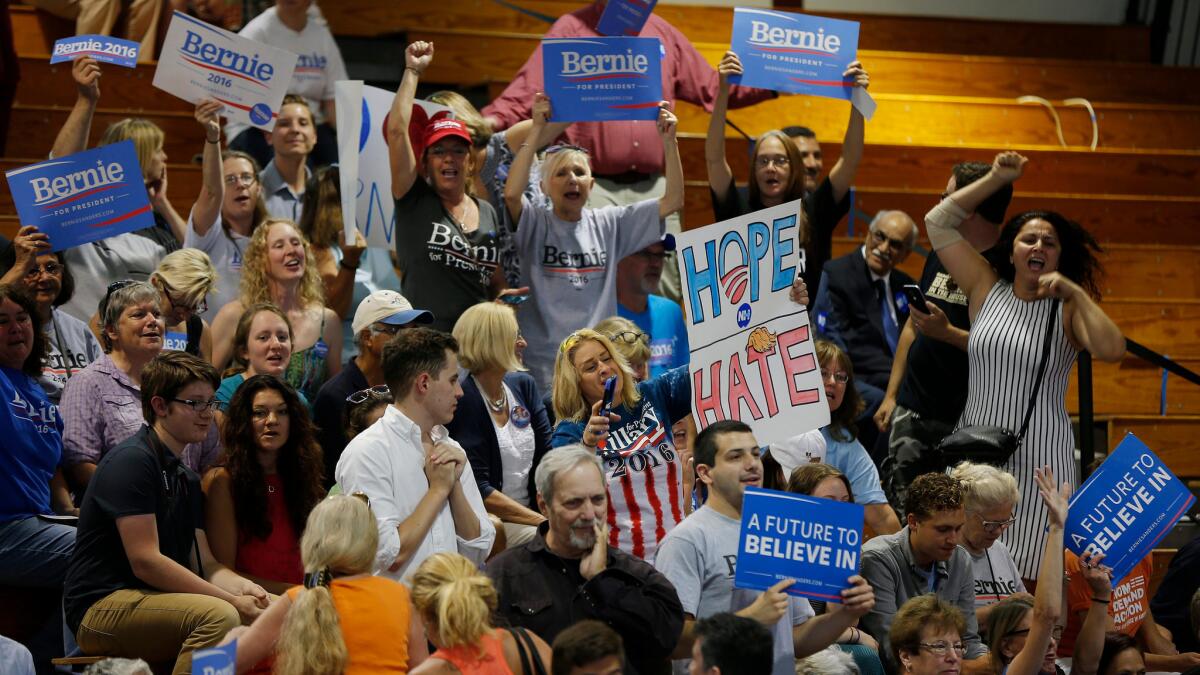Under pressure from Bernie Sanders, Democrats poised to change how they pick nominees

- Share via
Reporting from Philadelphia — Democrats reached an agreement on Saturday that could sharply reduce the influence of superdelegates in the next presidential election, resolving an emotionally charged issue that threatened to boil over this week.
The deal represents another way Bernie Sanders has left his mark on the Democratic Party despite being defeated by Hillary Clinton in the primary. The party’s policy platform has already been modified to reflect some of the Vermont senator’s goals, including a $15-per-hour federal minimum wage and free tuition for many college students.
Superdelegates, who are elected officials and party leaders who can throw their support to a presidential candidate independent of state primary results, have been a fault line this year. They overwhelmingly backed Clinton, sometimes even pledging their support before the first primary vote was cast.
Although superdelegates didn’t deliver Clinton her victory — she also won the popular vote and a greater number of pledged delegates — Sanders has argued that they play an undemocratic role in the nominating process.
The final deal approved by the rules committee on Saturday will create a commission that will draft changes to the superdelegate system. Only elected officials would be allowed to be superdelegates, reducing their numbers by two-thirds.
Although the commission’s final report — due in 2018, two years before the next presidential election — would still need to be approved by the full Democratic National Committee, the Sanders campaign is confident in the process.
“This would be a big step,” said Ben Jealous, a Sanders supporter and a former president of the National Assn. for the Advancement of Colored People.
We have to hang together, or we might hang separately.
— Arthur Cheliotes, a labor leader and Sanders delegate from New York.
The amendment creating the commission was overwhelmingly approved while committee members applauded and cheered, a show of unity that came on the heels of a divisive debate over the issue. Several expressed renewed commitment to defeating Republican nominee Donald Trump in November.
“We have to hang together, or we might hang separately,” said Arthur Cheliotes, a labor leader and Sanders delegate from New York.
Rep. Sheila Jackson Lee (D-Texas), who had resisted changes to the superdelegate system earlier in the day, also supported the amendment.
“We shall overcome and elect the next president of the United States, Hillary Rodham Clinton,” she said.
The agreement reduces the chance that the issue will spill over onto the convention floor this week, which could create a messy spectacle for Clinton at a time when she’s hoping for a unified front as she accepts the Democratic nomination.
TRAIL GUIDE: All the latest news on the 2016 presidential campaign »
The superdelegate system was created as an attempt to balance the voices of voters and political insiders after the landslide defeats of Democratic nominees George McGovern in 1972 and President Jimmy Carter in 1980.
It was reviewed after the 2008 election, when a Democratic commission said their influence should be sharply reduced. But party leaders ultimately did not follow that recommendation.
African American members of Congress have often argued to leave the system in place because it helps give minorities a greater voice in the nomination process.
Party leaders also haven’t wanted to lose their influence or allow a situation where elected officials would have to run against their own constituents for a delegate slot.
“We have been the cornerstone of building an inclusive party,” said Donna Brazile, a superdelegate and Democratic strategist. “I don’t think anyone should remove us from the room.”
But others fear superdelegates could be used to unfairly tilt the scales of the Democratic primary in the future.
“This is not about this election,” said Diane Russell, a Maine state representative. “This is about a generation of elections going forward.”
Twitter: @chrismegerian
MORE FROM POLITICS
Democrats’ new platform adopts many Sanders demands
The best lines from Donald Trump’s speech, according to California Republicans
Rep. Loretta Sanchez implies Obama endorsed Senate rival because they are both black
UPDATES:
6:05 p.m.: This article was updated to report that Democrats reached an agreement that could alter how the party selects presidential candidates.
This article originally published at 4:20 p.m.
More to Read
Get the L.A. Times Politics newsletter
Deeply reported insights into legislation, politics and policy from Sacramento, Washington and beyond. In your inbox three times per week.
You may occasionally receive promotional content from the Los Angeles Times.











